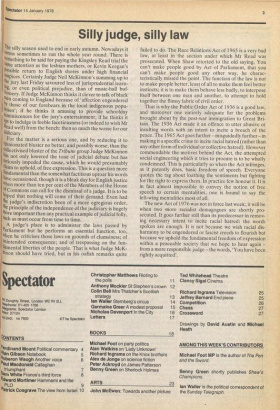Silly judge, silly law
Ilse silly season used to end in early autumn. Nowadays it eems sometimes to run the whole year round. There is sontething to be said for paying the Kingsley Read trial the laMe attention as the lesbian mothers, or Kevin Keegan's Possible return to English shores under high financial auspices. Certainly Judge Neil McKinnon's summing up to the jury last Friday savoured less of jurisprudential learning, or even political prejudice, than of music-hall buffoonery. If Judge McKinnon thinks it clever to talk of black ,loon coming to England because of 'affection engendered °Y those of our forebears in the local indigenous population'; if he thinks it amusing to provide schoolday reminiscences for the jury's entertainment; if he thinks it apt to indulge in feeble facetiousness (or indeed to wish Mr !(ead well) from the bench: then so much the worse for our Judiciary.
For the matter is a serious one, and by reducing it to Vinionated bluster no better, and possibly worse, than the c,ollectivised bluster of the Tribune group Judge McKinnon °as not only lowered the tone of judicial debate but has seriously impeded the cause, which he would presumably Claim to uphold, of free expression. This is a question more fundamental than the somewhat factitious uproar his words have occasioned, though it is a bleak day for English justice °ihen more than ten per cent of the Members of the House Of Commons can call for the dismissal of a judge. It is to be hoped that nothing will come of their demand. Even had the judge's indiscretion been of a more egregious order, the principle of the independence of the judiciary is hugely dlore important than any practical example of judicial folly, such as must occur from time to time.
A judge's place is to administer the laws passed by Parliament but he performs an essential function, too, Mien he criticises those laws on grounds of clumsiness; of unintended consequence; and of trespassing on the fundamental liberties of the people. That is what Judge McKinnon should have tried, but in his oafish remarks quite failed to do. The Race Relations Act of 1965 is a very bad law, at least in the section under which Mr Read was prosecuted. When Shaw retorted to the old saying, You can't make people good by Act of Parliament, that you can't make people good any other way, he characteristically missed the point. The function of the law is not to make people better, least of all to make them feel better instincts; it is to make them behave less badly, to interpose itself between one man and another, to attempt to hold together the flimsy fabric of civil order.
That is why the Public Order Act of 1936 is a good law, and moreover one entirely adequate for the problems brought about by the post-war immigration to Great Britain. The 1936 Act made it an offence to utter abusive or insulting words with an intent to incite a breach of the peace. The 1965 Act goes further misguidedly further in making it a specific crime to incite racial hatred (rather than any other form of individual or collective hatred). However commendable the motives behind the Act, the attempted social engineering which it tries to procure is to be wholly condemned. This is particularly so when the Act infringes, as it patently does, basic freedom of speech. Everyone quotes the tag about loathing the sentiments but fighting for the right to express them. In practice few honour it. It is in fact almost impossible to convey the notion of free speech to certain mentalities, one is bound to say the left-wing mentalities most of all.
The new Act of 1976 was not in force last week; it will be when two more racialist demagogues are shortly prosecuted. It goes further still than its predecessor in removing necessary intent to incite racial hatred: the words spoken are enough. It is not because we wish racial disharmony to be engendered or fascist creeds to flourish but because we uphold the fundamental freedom of expression within a peaceable society that we hope to hear again from a more responsible judge the words, 'You have been rightly acquitted'.






























 Previous page
Previous page